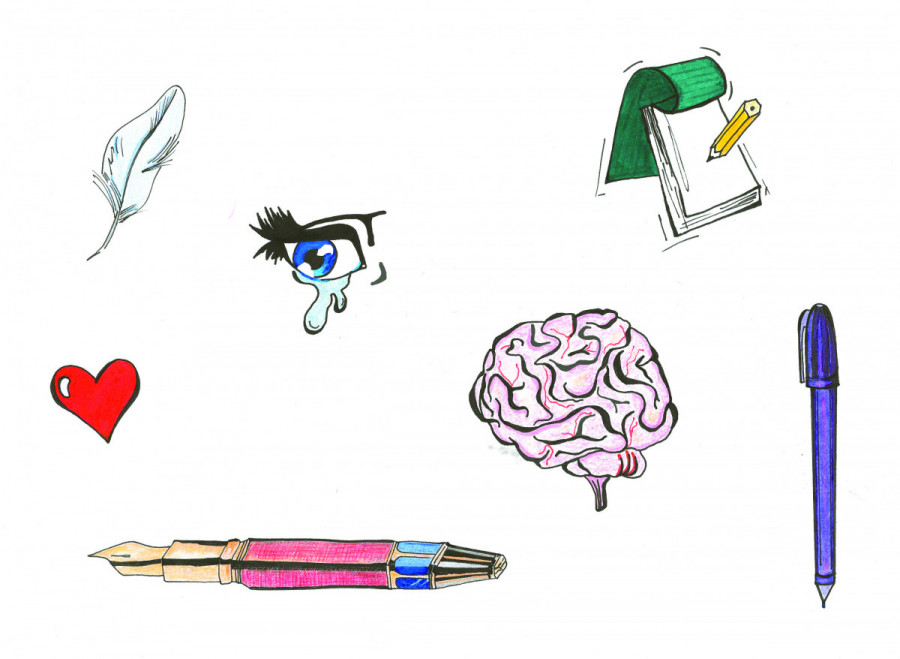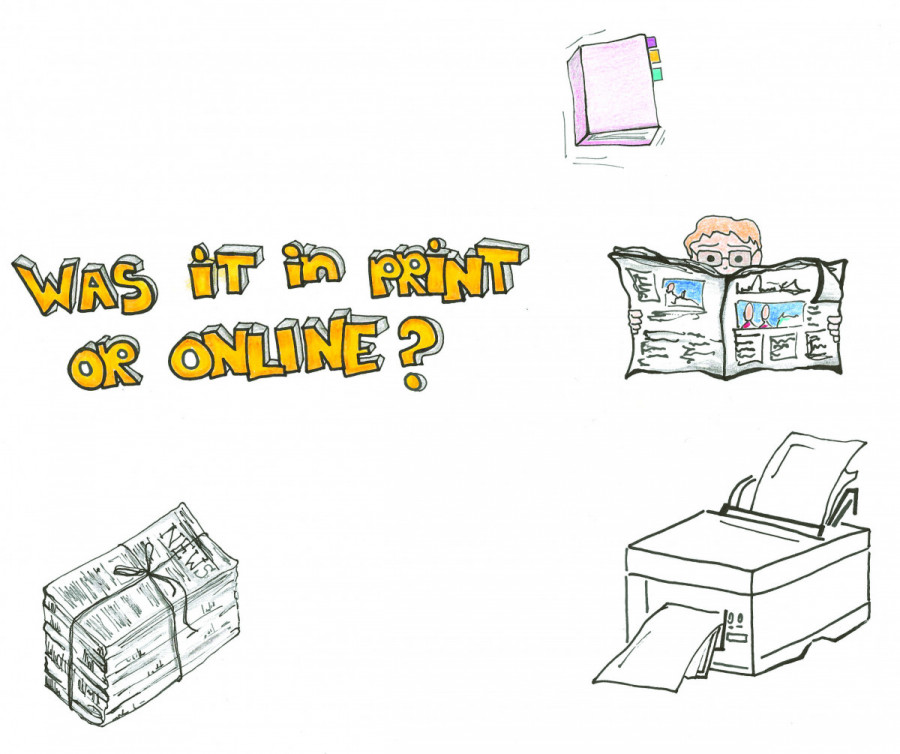Don’t @ Me: Paper Rocks
Digital Can’t Even
I often feel like I belong to another world, one in which people are more connected to each other and to life in every way possible.
This is difficult for me in the digital age.
One thing that has gradually slipped away from everyday life is the use of paper. As society has transitioned to a reliance on digital—whether to keep an agenda, to take notes, or to read and write—paper has become practically obsolete.
Let’s take reading as an example. With print, we are more connected to reality and the task at hand. The information is limited to its medium—paper. Reading on a tablet, however, might distract you with its constant flood of notifications and endless scrolling. Paper helps us fully focus on the available information; it’s tangible, it’s concrete.
A newspaper curates content for the reader and allows them to see articles and headlines they would otherwise never look for had they been consuming news online, where readers only click on articles that interest them. Print pushes readers out of their comfort zones, compelling them to broaden their horizons.
Digital breaks the presence of mind. We’ve heard it time and time again: our attention span is short and the constant presence of technology makes it worse.
Best-selling author Eric Barker is among many who believe that technology isn’t to blame. However, he wrote on his blog that it exacerbates a shorter attention span for humans because the brain is designed to keep seeking new information.

Reliability of paper
Paper rocks, and here’s why: it’s reliable. Files can be corrupted, your computer or smart phone can break down, get hacked, or it can freeze and die in the cold—iPhone users can relate. There is simply too much room for technical errors.
On paper, you are more connected to your writing. There are no distractions.
On paper, you can visualize, touch, and therefore remember better. Multiple studies have revealed that old-fashioned pen and paper note-taking helps the brain retain more information.
Of course, I won’t deny the conveniences of digitized typing. It is sometimes much more accessible. In fact, I’m typing this on my phone right now because it’s always on hand, ready to rescue any spontaneous idea that threatens to escape our minds.
Print culture and nostalgia
Although print media is sadly dying as digital media platforms take over, it still exists and serves an audience with a more old school mentality—one still attached to paper.
“It’s a real cultural thing, the printed daily newspaper. My grandparents, my parents, me, my friends—it’s just part of our lives,” said Michael Shenker, part-time journalism instructor at Concordia and former senior editor at the Montreal Gazette.
“Print was part of my routine […] I get up in the morning, I make a coffee, and I read the paper.” He said his erception of print reflects his age group since he spent most of his life without the internet. He’ll be turning 65 in February.
But why is it still cool to read a physical copy of the New Yorker? Is it the prestige? Why do we keep stacks of old magazines in our rooms, on our coffee tables? For the aesthetic? Why did you pick up this issue?
I believe some youths are attracted to print because a physical copy allows them to experience a culture that no longer exists, where they focus entirely on the material—similar to the hype around buying vinyl records today. Although everything can be found online, some still subscribe to weeklies like the New Yorker or Time.
There is an attachment to old times. Reading on paper feels nostalgic when everything around us is moving so fast that we can almost see the world turning.
The thrill of publishing print
We are a print publication. It makes sense that I stand for the value of print. The survival of print symbolizes a resistance to the online shift. But I am not the only news consumer or writer who sees its value. There’s just something about seeing your name in print, whether as the byline or as the subject in an article.
“When is it coming out in print, though?” contributors or interviewees often ask. Their response is always an “Oh…” trying to mask the slight disappointment when I tell them it will only be published online.
Even Shenker said that, as a writer, he values being in a print publication. The first question his friends asked when he got a byline in the New York Times four years ago was the good old, “Was it online or in print?”
It was print.
Whatever makes it to print these days is perceived as more curated or more valuable than whatever appears online, because print space is limited. But that isn’t necessarily the case.
Shenker’s news consumption habits, however, have completely changed; he now reads the news online on his smartphone.
In fact, he cancelled his print subscription to the New York Times just last year. The credibility of the sources and the quality of the information, he stressed, is the same regardless of the medium.
However, print conveys “a sense of proportion and hierarchy,” said Shenker, which are some of the benefits that cannot translate to an online format.
“As a consumer and also an editor, my judgment was reflected in the layout of that news page. Your judgment isn’t expressed with as much nuance as an editor in the online form as it is in the print form,” Shenker said.
Ultimately, Shenker believes that the convenience of online outweighs missing the whole print culture.
But for me, nothing beats the smell of an old book, the sound of a page turning, and the smoothness of paper under your fingertips.







